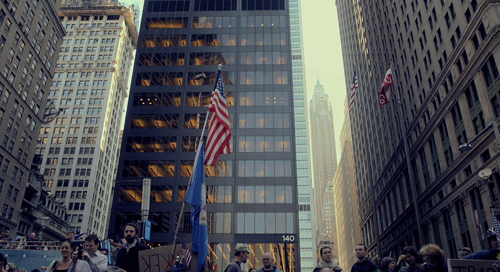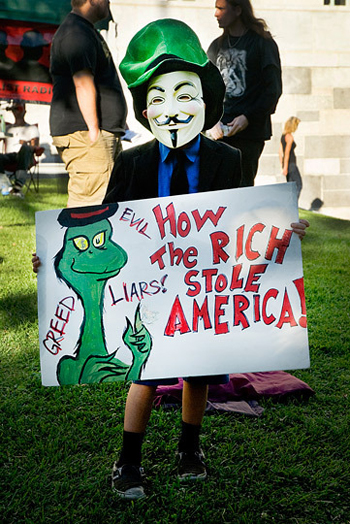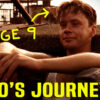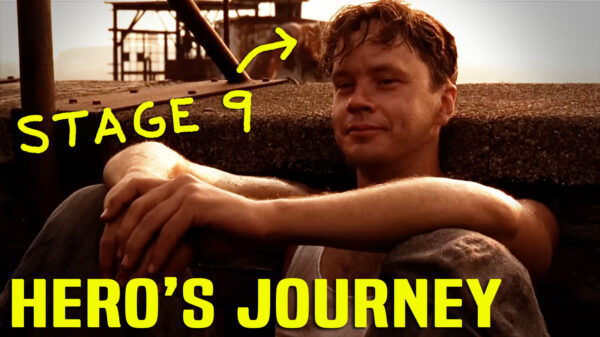IMPORTANT, ESSENTIAL (AND JUST NUTS): 99% –
THE OCCUPY WALL STREET COLLABORATIVE FILM
WILLIAMS COLE DOCUMENTARY FILM PRODUCER
In the middle of last September I came across a small blurb in one of the free daily papers circulated around New York City. It casually stated that some “students” and others were going to “occupy” Wall Street and protest economic injustice. Vague as it was, it immediately stood out to me. The subprime mortgage crisis and bank bailouts of 2008 were only the latest profound manifestation that our system had gone overboard. And it seemed this might be the beginning of something big.
As one of the founding editors of the Brooklyn Rail I had written of films that dealt with the growing economic crisis inherent in American capitalism before the great meltdown of 2008 and after. I’d produced an independent documentary about NYC under Rudy Giuliani (that took five or more years) and a film for HBO with Academy Award winner Barbara Kopple about guns in America (that took four years), films that both had strong social/political commentary (and, of course, I hope, good stories).
A week or two after I saw that little vague news piece, it was clear that Occupy Wall Street was a catalyst that had focused the frustration that had been boiling within American society for so long. For people that follow progressive “alternative” media and documentary and, especially long time organizers, many of these issues are part of a life long commitment and struggle. But suddenly, explicit challenges to Wall Street and the American Economic Order were being reported in mainstream media and all over the world. It seemed more than just significant. And, that it was inevitably going to be the subject of much filmmaking.

But from that filmmaking point of view it looked overwhelming, possibly crazy to try to document it all. From all the micro direct democracy at Zuccotti to growing occupations around the country; from how groups like organized labor, students, religious folk, veterans were mobilized to police violence; from the way the Occupy issues spread through poverty, economics and media to how politicians were dancing around the movement, it was a Big Topic, to say the least. There were potentially thousands of films and thousands of characters.
How could one there be one film that could attempt to due justice to such a big and multifarious movement? And how could it get done relatively quickly? It should be something more natural to the OWS movement and more exciting than one or two filmmakers going out and getting archival footage and making something boring in a year or two?
So when I was at a big OWS rally at Foley Square on October 5th and heard about a collaborative OWS doc in the works I knew it was the way. It wasn’t just a sole filmmaker with their auteur “vision.” This sounded like a way to bring multiple points of view, styles, aesthetics and ideas together – much like the OWS movement was doing – but toward a common goal: in this case to make a film. A film not directly connected to the OWS movement but which would play an important historical role in documenting the origins, the occupations and the voices throughout the fall-winter of 2011.

But did it sound easy. Hell no. Did it sound like a potential clusterf*ck. Sure it did. Were there any production funds? Hell no. But I got in contact with Audrey Ewell and Aaron Aites who had recently come up with the idea and we talked about the plan. The project had already been getting press in such venues like the New York Times and an already growing network of filmmakers from around the country (LA, Pittsburgh, Oakland, Minneapolis, etc.) were joining and submitting footage. Involved filmmakers ranged from well-intentioned observers to boots-on-the-ground activists. Places like Metropolis Post in NYC had reached out to pledge post services. Experienced post supervisors volunteered time. Tekserve donated a portable drive (we need many more). And lots of other people were doing lots of other things, in varying degrees of involvement (though props to Audrey who is exhausting herself).
There were meetings where we sketched out the idealized pragmatics of how footage would get wrangled, loaded, logged and edited by a yet undetermined crew of editors. What machines would we need? What drives? What are the specs for getting hi-res footage from one corner of LA – some in tapeless format, some on DV – into a seamless system setting?
In the meantime I organized an event for November where some footage would be shown and filmmakers, etc. could show up to at least meet. It happened on the evening of the morning that the NYPD evicted the occupation from Zuccotti Park.

Not surprisingly, any idealized plan melts away and adapts into what has to happen to get something done. And the enormous challenge of this project is still in a state of formation. Many people are pooling footage of important OWS events around the country. Others are acting as directors and editors covering various threads and there are many others in important roles with new people joining all the time. And it won’t be the definitive film. But it will be a film that will be different from what would be done by a single filmmaker who would take all the credit. Egos are checked.
To cover some extreme basics the first Kickstarter campaign was successful. Now, to cover the basic infrastructure of drives, media wrangling, etc. the SECOND – and more ambitious – campaign is underway.
Crowd funding like this has and will be essential and acts like development funds to keep the ball rolling on such a big project. It also involves people and raises awareness, something essential in a project like this–especially when people from all over have such positive reaction to the idea.
A pitch reel is almost complete that will give a taste of the scope and power of the collaborative vision of the film and we are going to use that to pursue production funding. To make this process work there has to be some resources: we can and will get there and this film will get made. But getting production funding will make it faster and more efficient. And we need experienced FCP 7 editors to get on board in order to get the ball rolling with the enormous amount of footage we have.
This particular project is not aiming to be the idealized philosophical collective filmmaking vision but, rather, a film that has an intrinsic collaborative nature with many directors and many editors credited. No matter what the failures might be in that idealized realm, I know that it won’t be “A film by…” one or two people (a perhaps necessary, sometimes deserved, but often disingenuous title that has become increasingly common in filmmaking).
Rather, it will be “by” a large group of people – professionals and amateurs – who came together and dedicated time, gear, skills and passion to document the genesis of a truly historical movement; A movement that has and will keep changing the narrative of our times.
And that, no matter what the barriers are, is just worth it.
BIO:
Williams Cole is a documentary film producer (Giuliani Time, Gun Fight) and a founding contributing editor of the Brooklyn Rail.
























